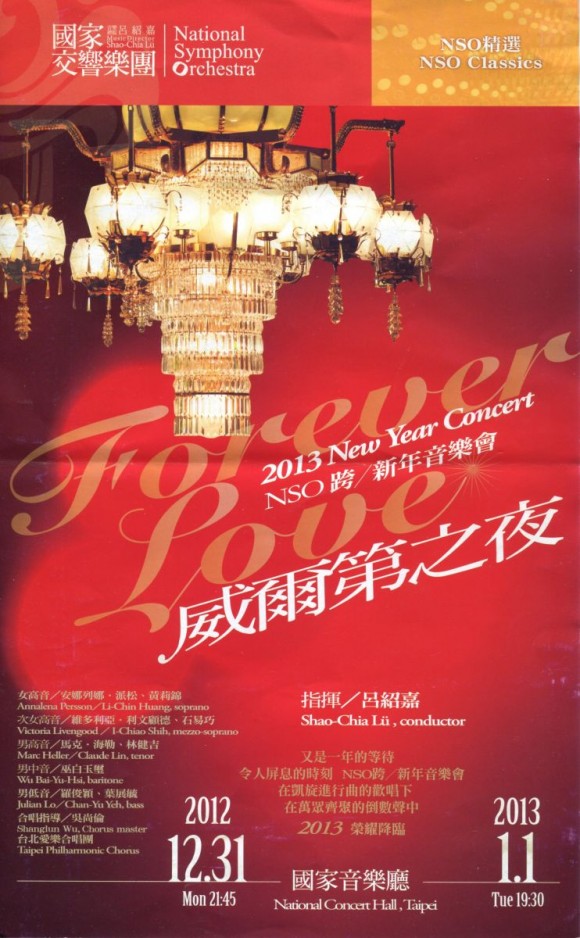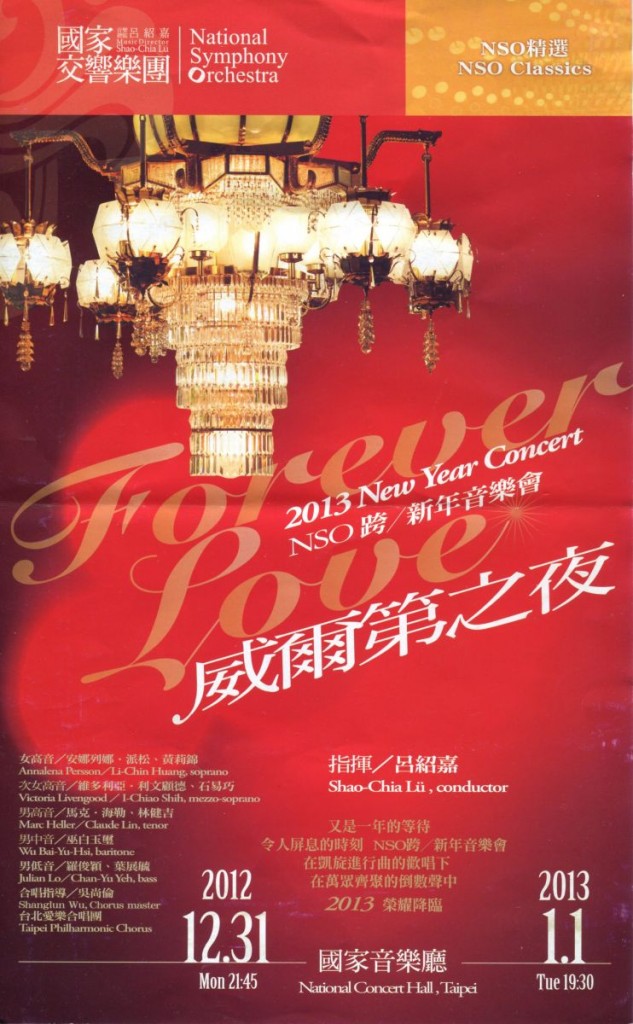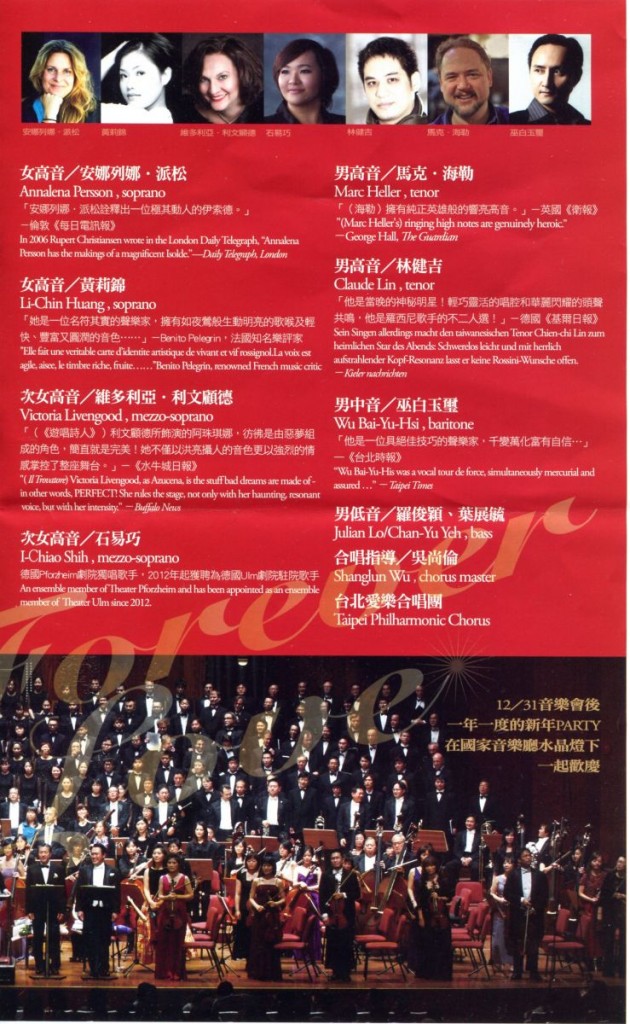“Forever Love” New Year Concert in Taipei
Wednesday, January 2, 2013
7:30 a.m. at a 7-11 on Bade Road
I’m sitting inside a 7-11 is just down the street from the building where I work. It’s only 7:30 now, and I don’t start work until 8:30, but I don’t mind leaving early sometimes. I have smooth sailing down the streets as rush hour hasn’t begun, and I can hang out and have a couple of cups of coffee before the work day begins.
It’s also interesting to break your routine a bit like this. You see new things. I usually am driving down Nanjing Road at around 8 a.m. on my way to work. Traffic is already quite heavy at that time, though not nearly as bad as it will get in even ten minutes. Traffic on Taipei roads is a bit like a flash flood. Even ten minutes can make a huge difference in the volume of traffic flowing. That’s why when I leave work at 5:45, I don’t generally dawdle. If I get out the door right at that minute, I’m okay. Every minute of delay results in like a 10% increase in the amount of traffic. A delay of even five minutes can mean really heavy traffic. Delay for ten minutes, and I’m stuck in gridlock.
The same thing happens in the morning. And by leaving this early, I have almost completely empty roads. It’s actually more dangerous than when there is a moderate amount of traffic. When the roads are completely empty, people’s driving skills plummet. They weave all over the road and drive at all sorts of different speeds. The large vehicles like buses and trucks simply take over and do whatever they want. And on a wet morning like today, it is even more dangerous. On a scooter, you end up going faster and faster as you try to stay on top of the crazy flow and keep out of the way of the taxi driver behind you trying to do 90 km/hr on a city street. Then you are suddenly facing the rear end of some massive construction vehicle doing 40 km/hr, and you have to weave around it on wet roads with your tires threatening to slip out from under you. It’s a lot of fun, actually, and I always regret arriving at work and having to park the scooter for the day. I’d rather just keep driving and driving. I think I could have led a very happy life as truck driver or a taxi driver. I just love to drive and move.
Anyway, I still haven’t gotten to the main thing I notice by leaving from my apartment this early on a weekday. I’ll be sailing along nearly empty Nanjing Road doing 60 km/hr thinking how great it is to have such empty roads. And then out of nowhere, I hit a massive traffic jam that lasts for two or three blocks. The reason? It’s always a school. I’m not exactly sure when the first class of the day begins, but these poor kids are being dropped off by their parents as early as 7 in the morning. Shortly after 7, the cars have piled up in front of the school several lanes deep as parents fight to get to the curb and drop off their kids. This happens in front of every school in the city every morning, but you’d never see it if you didn’t get out early. Seeing that makes me feel more sympathy for the students that I encounter at the schools. I always giggle internally when I see entire classrooms of students sleeping at their desks during lunch hour. But it makes sense. If they have to be at school at 7 every morning – and many don’t get home until 9 or 10 at night – they surely don’t get enough sleep. They must walk around in a permanent daze of fatigue. I’ll have to ask someone today exactly what time school starts here for junior and senior high school students.
Yesterday was New Year’s Day, of course. I celebrated it with an evening concert at the National Concert Hall. It was a fairly big event with the full National Taiwan Symphony Orchestra and a massive male and female chorus, plus six or seven opera singers and even groups of student performers joining in from the two balconies above and nearest the stage. On offer was a range of pieces from Verdi including the second act of Aida. I’d be lying if I said I was over the moon about the performance and would go back again and again. Like my intake of Chinese opera, I think my classical music needs have been met for a while. My tank is full, and I don’t think I need to go to a live performance of classical music for a while. When I started going out to these events, it was a great pleasure and was intensified by the chance to see the beautiful concert halls in Taipei. The draw for me was the chance to see a new venue and see a new part of Taipei just as much as the music. Now that the National Concert Hall is so familiar to me, I can afford to be more choosey in what I decide to go see. No need to go every week to see the full season of the NTO or anything like that. I can pick and choose particular pieces that I like. As I said to my lovely companion last night, my favorite performance to date is still “Political Mother” – a driving and powerful modern dance performance accompanied by heart-stopping heavy metal music – as far away from classical music as you can get. So though I can appreciate a piece of classical music, something a bit more upbeat generally goes down better with me.
The highlight of last night’s performance was easily the dynamic and expressive acting and singing of Victoria Livengood. The other opera singers were about what you’d expect – fairly staid and stiff in their bodies. They were exceptional singers, of course, but they “acted” only to the extent of looking dramatic and throwing their arms out to the audience when they really belted out a high or low night. Livengood, however, really shone on stage. She was totally convincing in her acting and had an incredibly expressive face. She threw herself into her performance heart and soul and her astonishing voice filled the theater from top to bottom. One or two of the other singers had quite a bit more trouble. The National Concert Hall is a big space, and you need a big sound to fill it. Most are not up to the task without amplified help. Livengood nearly blew the roof off the joint. Her presence affected all the other performers as well as everyone in the audience.
There were subtitles for the lyrics (projected on screens to the left and right of the stage), but these were in Italian, of course – the language of Verdi – and Chinese, so I didn’t really know what they were singing about. The name of the concert was “Forever Love”, so I could take a stab at what they were singing about, and many of the Italian words were recognizable to me, but I still didn’t really know what was going on. It probably would have been more enjoyable if I understood the meaning of the words they were singing.
My companion wondered, at the end, if there was going to be an encore. There almost always is. The audiences at the National Concert Hall have a superhuman capacity for applauding and they will continue to applaud through four or five curtain calls and then keep going until they finally get some kind of encore. The applause strikes me most of the time as almost perfunctory. Yes, people enjoyed the performance and are applauding to show their appreciation, but it isn’t entirely heartfelt. It is something you do, something you are expected to do, and you keep doing it until it is the appointed time to stop. Interestingly, it is generally the musicians themselves who decide when the applause should end. It doesn’t end naturally of its own accord. The audience applauds and applauds and applauds and lets the musicians and conductor take all their bows – singly and together – leave the stage, come back on stage, leave the stage, come back on stage, single out the chorus, now the violinists, now the trumpet soloist, everyone gets their due, and the applause goes on and on. My hands generally start to really hurt by this point and I have no choice but to stop. It’s too painful. But everyone else goes on and on until, suddenly, the conductor and the musicians all turn and head for the exits from the stage. The very second they do that – the instant it’s clear that they are leaving for good this time and not coming back – the applause stops like someone threw a switch. Total silence. It goes from roaring applause to dead silence in a heartbeat and then the audience races for the exits – like schoolchildren given the release from the confines of class.
My companion didn’t think there would be an encore, probably because there was such a complex range of performers. How do you organize that many people for an encore? But they had worked it out beforehand, and after a signal from the conductor, the entire chorus and symphony shouted out “Happy New Year” to the audience in Chinese, and then they went into a rousing performance of a popular piece of opera. I forget the name, but it was very upbeat, and the two youngest female opera singers danced and swayed on stage and smiled with obvious enjoyment. It was a happy and infectious moment and it capped the concert very well.
It had been raining when I went to the concert, and it was still raining when it was over, so my companion suggested that we walk back to the MRT by underground passages – essentially making our way through the massive underground parking lot. I was all up for that, since I’d always wondered what it looked like down there. It’s something I think about often – how large cities have dug down so many layers for basements, subway lines, and large underground structures, that what we think of as the “ground” really isn’t the ground anymore. The actual ground is generally several stories beneath our feet. The level on which we walk around in the city – street level – is not technically the ground anymore. It is several stories above the actual ground. This is very apparent at Chiang-Kai Shek Memorial (known as Democracy Square now, I believe). There are three large buildings surrounding a massive open and empty square. This square is generally filled with people walking around, and everyone there has the feeling that they are walking on the ground. They are walking on paving stones, of course, and it feels like the ground. Yet, it isn’t the ground at all. They are in fact just walking around on the roof of the parking garage underneath. When my companion and I walked through the parking garage, I imagined we were now walking on the true ground. But that might not have been true either. For all I know, there is another layer of human construction underneath the parking garage and down and down.
I have had four days off from work, and you’d think that would mean I’d be refreshed and raring to go. But nothing could be further from the truth. I feel exhausted right now and the thought of the work waiting for me a few buildings over and six floors up just makes me tired and sad. That happens all the time now. It used to be that the weekend would refresh me and I would feel good on Monday mornings. Things have changed, though. I never feel refreshed on Monday mornings. Even after a four-day holiday I feel fatigued. I don’t think there is any great mystery about why that would be. I’ve just been doing this work for a long time, and my mind is currently occupied with thinking past it as I think ahead and plan for my February 28th departure from Taiwan. I think the weather also has something to do with it. This endless grey gloom can do weird things to your head. There is no rhythm to the day and night – no sunrises, no sunsets, no variation. It’s just grey and gloomy and then dark and gloomy for day and night and another day and night.



